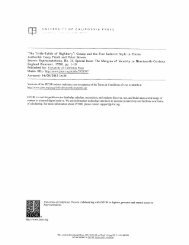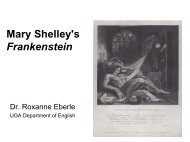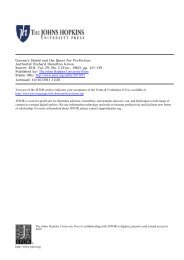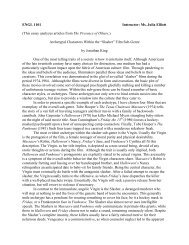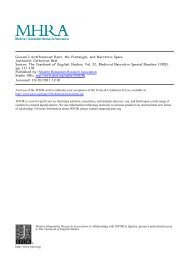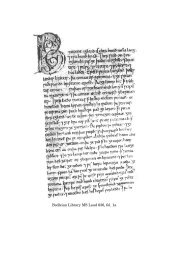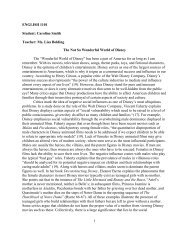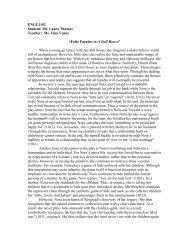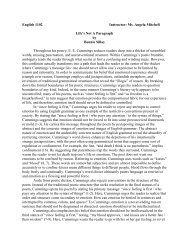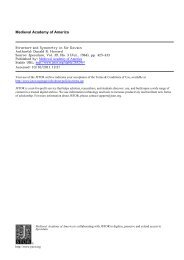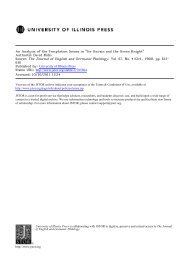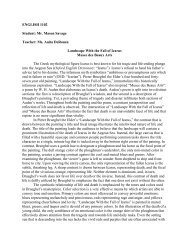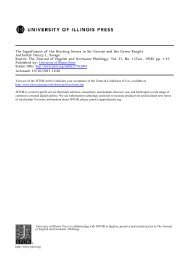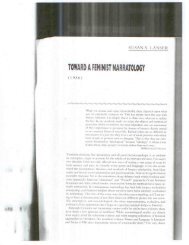Spivak and Parry Notes
Spivak and Parry Notes
Spivak and Parry Notes
You also want an ePaper? Increase the reach of your titles
YUMPU automatically turns print PDFs into web optimized ePapers that Google loves.
assuming an identity constructed from the “axioms of imperialisms”; the<br />
unassimilated “native” (799-800)<br />
“claiming to be Caliban legitimizes the very individualism that we must<br />
persistently attempt to undermine from within” (800)<br />
Sees in the Anglo-American feminist exaltation of individuality <strong>and</strong> agency a<br />
dangerous corollary in imperialist ideology which underpins (<strong>and</strong> is created by)<br />
nineteenth-century English literature<br />
<strong>Spivak</strong> contesting feminist assertions about literature that ignore the “fact” of<br />
imperialism <strong>and</strong> the ways in which many nineteenth-century women writers exalt<br />
individualist agency without acknowledging the ways in which such an agenda<br />
supports the imperialist project: from the post-colonialist perspective white women<br />
are not necessarily separate from structures of power that oppress, but rather part<br />
of those structures<br />
<strong>Spivak</strong> interested in tracing out the ways that Jane Eyre (a canonical text of<br />
female individualism) depends upon the “axioms of imperialism,” which readers<br />
then uncritically celebrate (798)<br />
a larger critique of our privileging of the “female subject”; a “worlding” which<br />
relies upon the simultaneous "unworlding" of the "Other"<br />
addresses the text <strong>and</strong> not Bronte herself; “my readings here do not seek to<br />
undermine the excellence of the individual artist” (799)<br />
“the readings will incite a degree of rage against the imperialism narrativization of<br />
history, that it should produce so abject a script for her. I provide these assurances<br />
to allow myself some room to situate feminist individualism in its historical<br />
determination rather than simply to canonize it as feminism as such” (799)<br />
argues that the imperialist project insists on either "childbearing" or "soul<br />
making" both of which are dependent upon excising the "native female" (799)<br />
reads opening scene as indicative of Jane's "self-marginalized uniqueness"<br />
with the reader as "accomplice" (800)<br />
Reads Jane as having to move from “counter family” (<strong>and</strong> outsider) to “family-inlaw”;<br />
a move that requires the immolation of Bertha, whose “Otherness” leaves her<br />
subject to be excised from her marriage to Rochester; "other" because she exists on a<br />
human/animal frontier (801); notes that the novel insists upon "a good greater than the<br />
letter of the Law"; a "divine injunction"<br />
The novel achieves both child bearing (i.e. Jane) <strong>and</strong> soul making (St. John),<br />
which maintains the male/female <strong>and</strong> public/private binary (803



